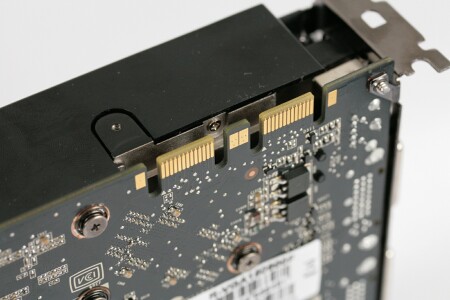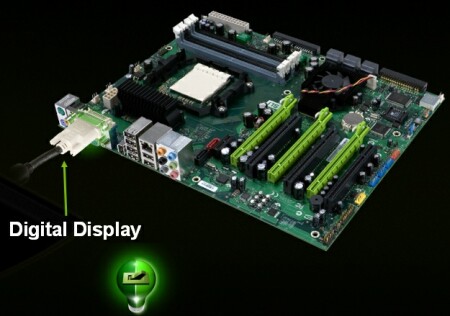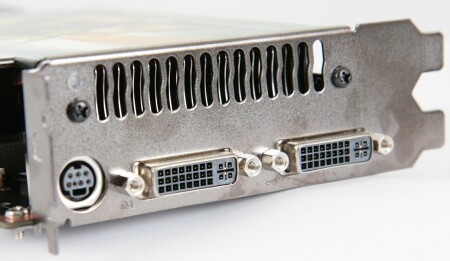Nvidia GeForce 9800 GTX Review
GeForce 9800 GTX: New Wine In Old Bottles
Before we take a more detailed look at the card, let's compare the technical specifications of the GeForce 9800 GTX with those of its competitors.
Specifications: Test Cards
| Specifications Of The Main Cards | ||||
|---|---|---|---|---|
| GPU | HD 3870 X2 | 8800 Ultra | 8800 GTS 512 MB | 9800 GTX |
| GPU frequency | 825 MHz | 612 MHz | 650 MHz | 675 MHz |
| Shader clock frequency | 825 MHz | 1512 MHz | 1625 MHz | 1688 MHz |
| Memory clock frequency | 900 MHz | 1080 MHz | 970 MHz | 1100 MHz |
| Memory bus width | 512 bits | 384 bits | 256 bits | 256 bits |
| Memory type | GDDR3 | GDDR3 | GDDR3 | GDDR3 |
| Memory quantity | 2 x 512 MB | 768 MB | 512 MB | 512 MB |
| Number of pixels/Vertex Pipelines | (160) | (32) | (32) | (32) |
| Number of texturing units | 32 | 32 | 64 | 64 |
| Number of ROPs | 32 | 24 | 16 | 16 |
| Processing power | ~1 TFlops | 387 GFlops | 416 GFlops | 432 GFlops |
| Memory bandwidth | 115.2 GB/s | 103.7 GB/s | 62.1 GB/s | 70.4 GB/s |
| Number of transistors | 1334 million | 681 million | 754 million | 754 million |
| Process | 0.055µ | 0.09µ | 0.065µ | 0.065µ |
| Die surface area | 2 x 196 mm² | 484 mm² | 324 mm² | 324 mm² |
| Generation | 2008 | 2007 | 2007 | 2008 |
| Shader Model supported | 4.1 | 4.0 | 4.0 | 4.0 |
One thing jumps out at you right away - the similarity between the 9800 GTX and the 8800 GTS 512 MB. They share the same GPU (G92), number of texturing units, memory, features and so on. The only difference is the 9800 GTX' slightly higher operating frequencies, resulting in processing power that's a little less than 4% higher, and - more importantly - offers 13% greater memory bandwidth. The latter is still well below that of the 8800 Ultra or even the 8800 GTX (86.4 GB/s, with 768 MB, of course), which is another reason to doubt the appropriateness of the name "GeForce 9800 GTX".
So to find justification for the name, Nvidia is emphasizing such features as triple-SLI support (supported until now only by the ageing 8800 Ultra and GTX) and the more interesting Hybrid Power. But for that, we'll have to wait until compatible motherboards come out - which makes the feature less of an argument in favor of the 9800 GTX. Because whether you're about to buy a new system today or just want to update your graphics card, your motherboard won't be able to support the triple-SLI feature.
Finally, there's an LED indicator on the card, but it doesn't indicate proper operation of the card once the computer is powered up (unlike the ones on the 9800 GX2, which told you that all the power connectors were correctly plugged in).
Get Tom's Hardware's best news and in-depth reviews, straight to your inbox.
Current page: GeForce 9800 GTX: New Wine In Old Bottles
Prev Page Introduction Next Page The Point Of View 9800 GTX-
BPT747 Interesting results, I have found several card makers (Palit, Asus, Evga, and Zotac) that make a 1GB 8800GT(S). Since you were speaking of the memory limitations of the 9800GTX, I am curious how these cards would preform with the 8800 driver optimizations you mentioned.Reply -
Spectere I purchased a GF9800GTX not long after it came out and the only time I recall hearing the fan spin up to high (which is fairly loud) is when the card first initialized itself when I turn my system on. I've logged many hours of game time on this rig and haven't heard it spin up at all. I'm using the ForceWare 174.74 drivers and an XFX branded card (if that would make any difference at all...probably not).Reply -
teamjawbox Would an Intel Core 2 Duo Dual Core E6600 (2.4ghz) 1066FSB processor bottleneck the 9800GTX? Trying to decide whether to get one or not and dont want to get it and not see an increase in performance due to my processor. Thanks!Reply -
TiberiumSoldier i am going to buy an intel Core 2 Duo E8500 with ASUS or XFX or eVGA 9800gtx and 2gb Corsair Dominator ram.. is this a good option??? or i should buy an AMD Phenom 9600?Reply


